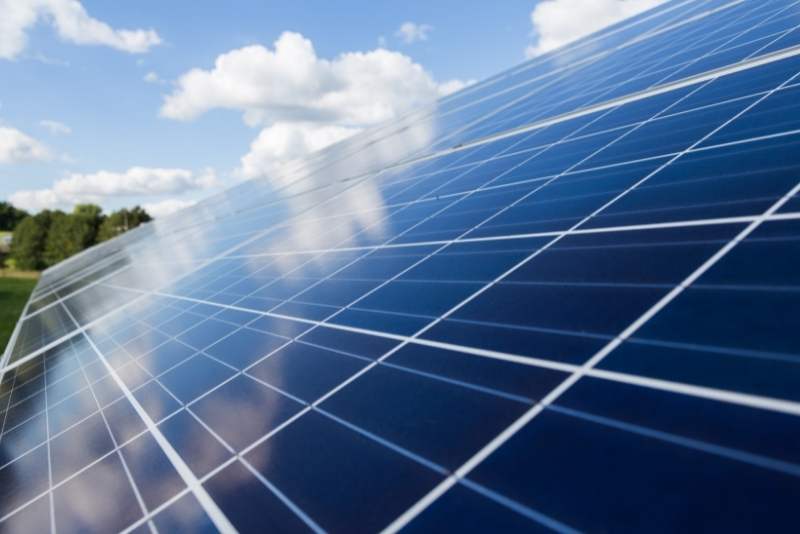
Solar technology converts sunlight into electrical energy through photovoltaic (PV) panels or mirrors that concentrate solar radiation. This energy can be used to generate electricity or stored in batteries or thermal energy storage. Here we will tell you more about solar radiation and how we can capture it.
How does solar energy work?
Solar radiation is the light emitted by the sun, also known as electromagnetic radiation. Although every place on Earth receives some sunlight during the year, the amount of solar radiation that reaches any one place on the Earth’s surface varies. Solar technology can capture this radiation and convert it into useful energy.
When the sun shines on a solar panel, the energy in the sunlight is absorbed by the photovoltaic cells in the solar panel. PV cells are mainly made of silicon material, and when photons (particles of light) hit the silicon material, they excite electrons, which creates an electric current. An inverter then converts the direct current into alternating current (AC). AC is the type of current that most of the electrical appliances in our lives require. We use AC when we plug an appliance into a regular wall socket.
Solar energy is a renewable, unlimited energy source that does not produce harmful greenhouse gases. When we are on Earth, we have energy as long as the sun continues to shine.
Classification of solar energy
Solar power
Sunlight shines on photovoltaic panels, generating direct current. Direct current is converted into alternating current through an inverter, which can be directly used for daily household use, such as refrigerators, televisions, air conditioners, etc. If there is excess electricity, we can also choose to connect the electricity to the grid.
Solar thermal energy
Solar collectors absorb solar energy and convert it into heat, which is conducted through fluids (such as water or antifreeze) for applications such as heating water or providing space heating. Thermal storage devices are used to store thermal energy for use when there is insufficient sunlight.
What is a solar power plant?
Solar power plants, also known as solar parks or solar fields, are facilities designed specifically for large-scale production of solar power. They are usually composed of a large number of solar photovoltaic panels (or solar collectors) distributed over a wide area of several acres, which can collect a large amount of solar energy at the same time. Solar power plants are designed for large-scale solar power generation and can be directly delivered to the grid.
This type of power plant has high efficiency and can achieve stable power supply, but the construction and maintenance costs are high, and it is usually suitable for areas with abundant sunshine and vast land.
Advantages of solar panels
Solar panels use sunlight as a continuous source of energy that will not be exhausted. No carbon dioxide or other harmful pollutants are produced during the power generation process, reducing greenhouse gas emissions and air pollution. Once installed, solar panels can significantly reduce or even eliminate electricity bills, especially in sunny areas.
Solar panels usually have a long service life (20-25 years or more) and can be installed in residences, commercial buildings, industrial facilities, and remote areas to provide power for different scenarios. Solar panels allow your home to be self-sufficient and not dependent on the grid.
Although the initial investment is higher, in the long term, significant financial returns can be achieved through savings on electricity bills and possible revenue from electricity sales.
Solar panel care and maintenance
Most solar panel systems don’t require much regular maintenance or upkeep. For example, clear snow from battery panels to avoid blocking sunlight. Trim surrounding trees to prevent shade from blocking the panels. If you live in the suburbs, you need to prevent small animals (such as birds and squirrels) from entering the panel and connecting cable area to avoid causing damage.
Please check the working status of the inverter regularly to ensure its normal operation, because the inverter is an important device for converting DC power into AC power. It is recommended to ask professionals to conduct a comprehensive inspection every year to check the status of various components such as battery panels, inverters, wiring, etc., so as to discover and deal with potential problems in a timely manner.
Solar panel maintenance and upkeep is not complicated, but it needs to be done regularly to ensure efficient operation and long life of the system. With cleaning, inspection, professional maintenance and protective measures, solar panels can continue to provide you with clean, renewable energy. If your power generation capacity starts to decrease and it’s not due to weather, you may want to consult a professional.
